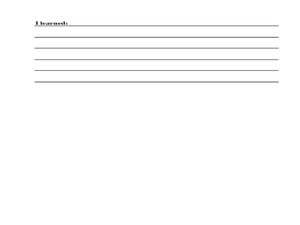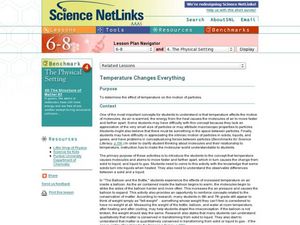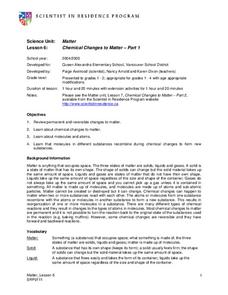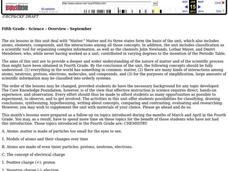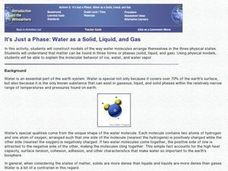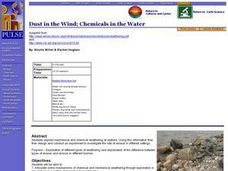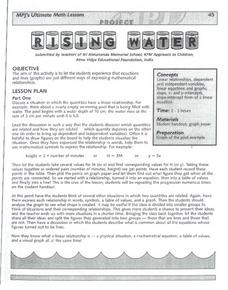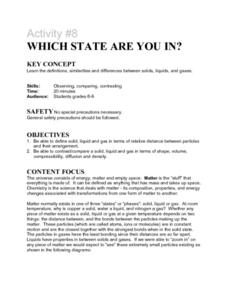Curated OER
Changing States of Matter - Making Ice Cream
Students make ice cream as a result of viewing changes of states of matter. In this matter lesson plan, students learn how heating and cooling can effect a state of matter to change.
Curated OER
Weather Lesson 1
Students describe and compare the layers of the atmosphere. They explain how to measure the temperature of the atmosphere. They also explain what causes the atmosphere to heat up in some places more than in others.
Curated OER
Putting the Ice in Hockey
Eighth grade physical science classes examine why the ice on which hockey is played is slippery. They do so by discussing phases of matter and the molecular motion in each. They read an article on a website and write out answers to...
Curated OER
States of Matter
Pupils study the vocabulary of the states of matter. In this states of matter vocabulary lesson, students investigate and study the meaning of the words solid, liquid, and gas. They experience demonstration lessons that give them...
Curated OER
Matter: Build a Word
Fourth graders examine matter and the periodic table of elements. In this matter lesson, 4th graders discuss atoms and their composition. Students explore the periodic table of elements and use it to spell words out of the elements.
Curated OER
Temperature Changes Everything
Middle school chemists visit interactive websites in order to discover what happens to molecular motion when heat is added to matter. They conduct an experiment that demonstrates the expansion of matter with the addition of heat. A lab...
Curated OER
Density
Students, in groups, design a procedure to calculate the mass of gas molecules in the classroom by measuring the volume of the classroom and researching the density of air. They apply changes in air density with altitude and effects on a...
Curated OER
Matter
Students recognize that some changes to matter are reversible and some are not. For this matter lesson, students experiment a physical and chemical change. Students record experiment results in their science journals. Students act...
Curated OER
Boot Reer Root Beer
Fifth graders investigate chemical reactions. In this physical science instructional activity, 5th graders make dry ice root beer and identify the type of change that occurs to the root beer mixture.
Curated OER
Heat Transfer & Phase Changes
In this heat transfer and phase change worksheet, students experiment with ice, salt, and milk to show the relationship between the temperature of a solution and its phase. Students turn milk from a liquid to a solid and graph the...
Virginia Department of Education
Charles’ Law
Searching for a relatively interesting way to demonstrate Charles' Law? Here is a lesson in which pupils heat air inside a flask and then cool the flask to quickly cool the air. They make observations about what occurs during the...
Curated OER
Matter
Fifth graders investigate the nature of matter and of the scientific processes associated with them in this series of lessons.
Curated OER
Hot Air Balloons
Young scholars examine how a hot air balloon works. In this hot air balloon instructional activity, students do an experiment to test the effects of heat on density. Young scholars make their own hot air balloon and act out how nitrogen...
Curated OER
Water Cycle Stories
Students create water cycle stories. In this water cycle lesson, students review the parts of the water cycle. They create a story that describes the journey of a water molecule as it makes its way through the cycle and into different...
Curated OER
Water and Ice
Learners perform experiments in pairs to visualize the changes in water during freezing and melting. In this properties of water instructional activity, students use their senses and inquiry tools to understand the changes in state of...
Curated OER
It's Just a Phase: Water as Solid, Liquid and Gas
Students construct models of the way water molecules arrange themselves in three physical states - solid, liquid, and gas. They explain the molecular behavior of ice, water, and water vapor.
Curated OER
Dust in the Wind; Chemicals in the Water
Students explore mechanical and chemical weathering at stations. They articulate some mechanisms of chemical and mechanical weathering through exploration in a lab. Students stations describe how chemical weathering differs from...
American Chemical Society
Changing State: Evaporation
Why do experiments require a control? Guide scholars through designing an experiment to see what they can do to evaporate water faster with a lesson that stresses the importance of controlling all variables. The second activity...
Curated OER
Classifying Matter Game
Students identify the different states of matter. In this chemistry lesson, students differentiate the physical properties of the three states. They apply what they learned by playing a team game at the end of the lesson.
Curated OER
How Does a Liquid Become a Solid?
Students explore the energy changes from a liquid to a solid. They model the arrangement of a solid and the change in states due to changes in energy using desks and chairs. Assessment questions are provided in lesson plan.
Curated OER
Somethin' Sweet
Students make their own candy. In this science lesson plan, students observe how molecules interact with each other in physical changes and observe how the addition of heat can cause molecules to interact and form new molecules in...
Curated OER
Rising Water!
Students observe water change from a liquid to a gas state when heated and then return to its liquid stage when cooled. They learn that gas molecules move faster than liquid molecules. They discover physical properties that describe how...
Cornell University
Glued into Science—Classifying Polymers
Explore the unique characteristics of polymers. A complete lesson plan begins with a presentation introducing polymers. Following the presentation, young scientists develop a laboratory plan for creating substances using polymers....
Curated OER
Activity #8 Which State Are You In?
Young scholars define, give similarites and differences between solids, liquids, and gases. They compare and contrast a solid, liquid and gas in terms of shape, volume, compressibility, diffusion and density. Pupils classigy common...
